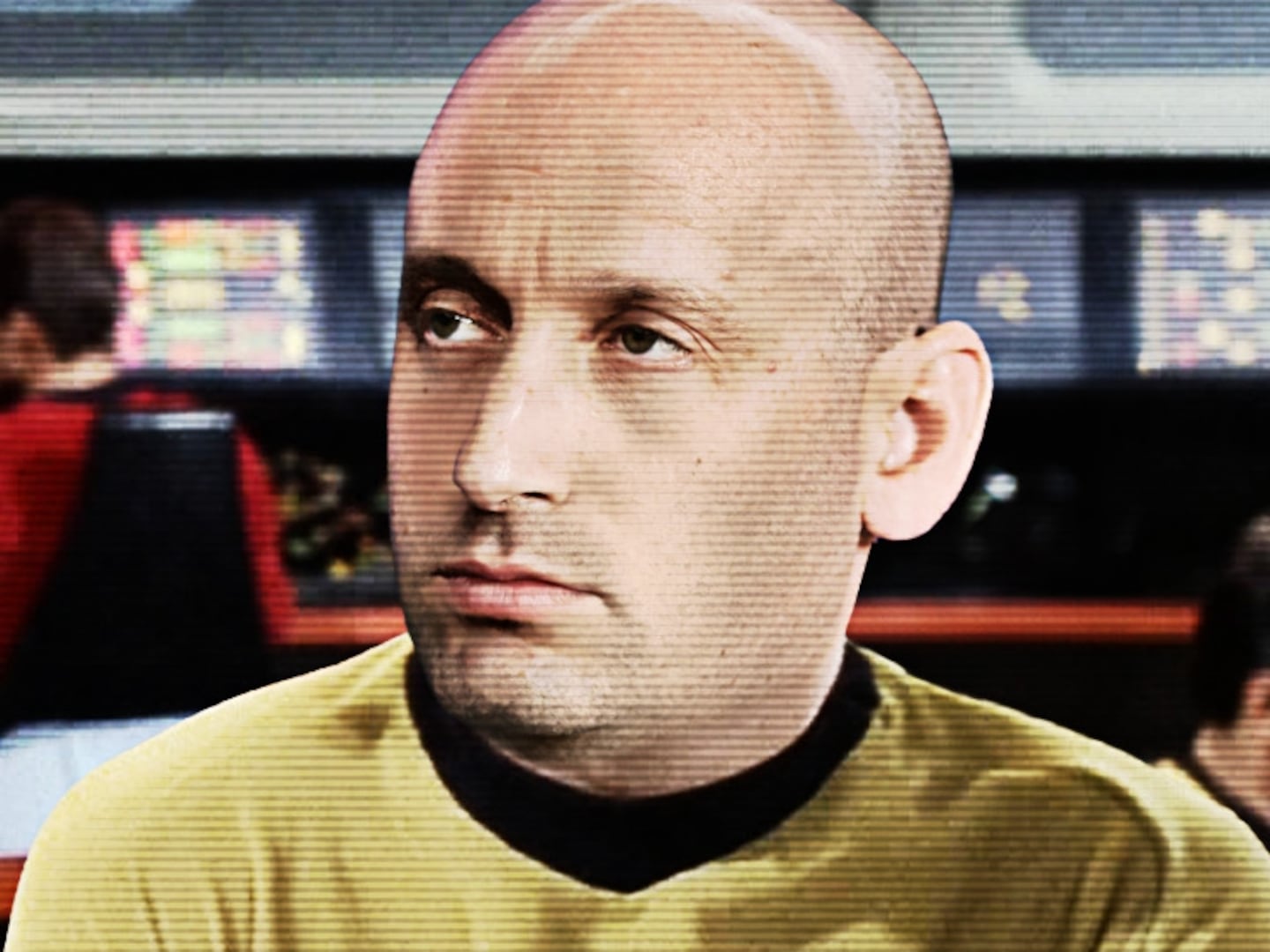“Hopefully there will be a Sundance next year,” Peter Dinklage grumbles.
I’m seated across from the award-winning Game of Thrones star in Park City, Utah, where the Sundance Film Festival is well underway. And while Dinklage is here to talk up his new film, Rememory, his attention can’t help but travel to the grim reality of life under President Donald Trump. Days before our chat, reports surfaced that Trump, a Philistine whose favorite film is forty-five assorted minutes of Bloodsport, was planning to cut the National Endowment of the Arts. It’s a classic dictator move, stifling artistic freedom in the service of nationalism.
“It’s always the first to go, isn’t it?” says Dinklage, shaking his head. “Art, then education: the two most important things—and climate, of course. But if anything, I think the voices will get a little louder. Unfortunately, sometimes it takes adversity to create something great.”
Rememory, directed by Mark Palansky (Penelope), is the genre-bending tale of Sam Bloom (Dinklage), a man haunted by the death of his best friend in a tragic car accident, who becomes embroiled in a possible murder-mystery involving the late Gordon Dunn (Martin Donovan)—a genius physicist who’s developed a machine that can extract memories from patients. Dunn’s aim is noble, that he wishes to mine these memories in order to help users confront their past as a way of moving forward, but there are unforeseen side effects. And when Dunn winds up dead, Bloom must navigate his memories, and his troubled test subjects, in order to unlock the truth.
Dinklage delivers a remarkably nuanced performance—this time alongside a talented ensemble that includes Julia Ormond, Henry Ian Cusick, and the late Anton Yelchin. Although the actor, who was born with achondroplasia (a type of dwarfism), has produced a career filled of rich characters since making his debut in Steve Buscemi’s 1995 film Living in Oblivion—as an actor irritated by the unpleasant roles he receives due to his stature. The 2003 film The Station Agent, which premiered at Sundance, made him a household name, while the HBO series Game of Thrones, and his deliciously saucy turn as booze-loving imp Tyrion Lannister, elevated him to Golden Globe-winning global megastar.
But back to the film. What memory would you ‘delete’ if you could? I ask him.
He laughs. “I would delete what just happened the last couple of days and… have a different reality,” he says of Trump’s inauguration. “I want to delete a couple of days before the election when some bombs were dropped that weren’t true. I want to delete my entire teenage years.”
The mention of his teenage years reminds me of the 47-year-old actor’s amazing high school yearbook photo that set the internet ablaze a few years back—‘80s mullet and all.
“Yeah, I guess some guy I went to high school with just leaked that onto the internet. Thanks, bro!” he exclaims, grinning and shaking his head. “But I remember thinking, you know, my hair looked pretty good for that photo in 1986. I was well coiffed. I thought, Should I go with the gold chain, or not? You know what? I’m gonna skip the gold chain. I mean, I’m from Jersey and it’s the ‘80s, come on! You can’t escape that. Cast the first stone—or Drakkar Noir.”
Palansky and Dinklage employed a fascinating crowdsourcing experiment for Rememory, asking the public to submit video and audio clips of cherished memories that could find their way into the film.
“We got tons of weird shit,” shares Palansky. “We got one guy’s engagement, bachelor party, wedding, and honeymoon footage. And the bachelor party was… what you’d think a bachelor party was. It was all there.”
The film team ended up using about seven submitted clips in the final product, which made its world premiere at Sundance. And the movie, though tonally schizophrenic, poses some interesting questions about how we process and define memories, as well as the impact of technology on our lives.
“It’s about what technology is doing to us—for better or for worse. Some days I think technology is amazing, some days it’s the unhealthiest thing in the world, and destroying us,” says Dinklage.
He pauses, as if deep in thought. “I’m not going to get on my soapbox about it, but people, in terms of memory stuff, want to take my picture all the time because I’m on a popular TV show, and they don’t want a memory of it—they want the proof of the memory. It’s so strange,” he says. “They don’t want an experience, they just want [click], and they don’t even meet me, really. The nice ones ask. Lots of times, though, people just snap a photo.”

“What is the memory if there’s nothing to hold on to in that moment? If there’s just a picture of it?” asks Dinklage. “And then they’re going to put their own version of the truth, or what the memory was, onto it. Somebody will take my picture and then six months later, they’re going to probably fabricate their own memory of that time they took this picture of me. They met me, but they didn’t.”
I was, unfortunately, warned as I walked into our interview that the talk would be cut short if any Game of Thrones questions were asked, which made me feel uneasy. But, given that the subject of the film is memories, I did wonder if Dinklage had heard of the internet’s wacky conspiracy theory concerning Shazaam, a non-existent movie where Sinbad plays a genie, and one that thousands upon thousands of online geeks swear to god they saw.
Sadly, Dinklage hadn’t heard of it—but he did nonetheless manage to debunk it. “That’s fascinating!” he exclaims, clapping his hands. “Oh, it’s Shaq! Shaquille O’Neal. Kazaam!”
What is or isn’t real and what is or isn’t a memory factors heavily into Bloom’s journey in Rememory. And, at a time when our own president is accusing CNN of being “fake news” following an election where actual “fake news” publishers—Infowars! Breitbart! LifeZette!—helped guide him to victory, it’s become harder and harder for people to determine the truth.
Hell, even the phrase “alternative facts” has somehow entered the national discourse. “The internet is doing a bang-up job with that,” Dinklage says of fake news. “You’ve just got to turn it off, man. It’s a button. Just turn it off, and you go for a walk in the woods. It’s so easy. People just can’t turn it off, and they don’t want to.”
In the public’s defense, it’s been pretty damn hard to just “turn it off” in the age of Trump. Just the other day, Dinklage was one of several A-listers—along with Kristen Stewart, Charlize Theron, Kevin Bacon, and scores more—who participated in the satellite women’s march against Trump at Sundance, led by comedian Chelsea Handler. It was, for him, a profoundly moving experience.
“We didn’t really get much heckling at the march yesterday,” says Dinklage, “but really, I love that I’m here. I’m throwing myself into this community that I love the most, and the art form I love doing. Call it a ‘liberal bubble’ or whatever, but I feel it’s great to be here because we’re all expressing ourselves. We all get to be angry together.”






